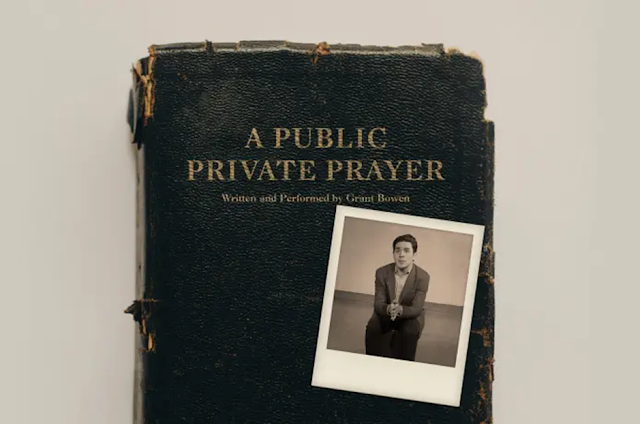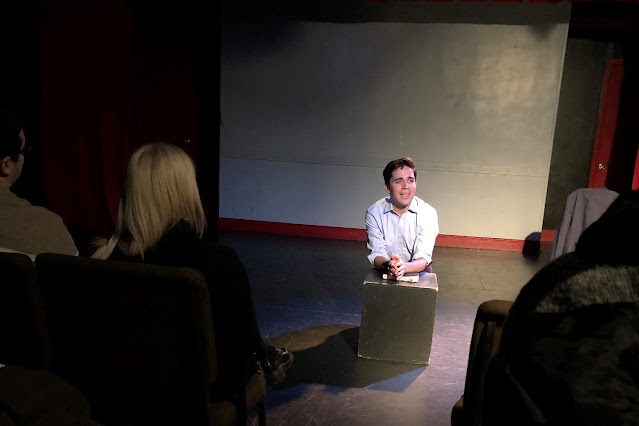A Public Private Prayer
Written and Performed by Grant Bowen
Directed by Amanda Pinto
85 E 4th St., Manhattan, NYC
February 16-March 6, 2022
 |
| Image courtesy Emily Owens PR |
There is a movement among those raised in Evangelicalism, defined broadly, called “deconstruction.” It’s a messy word to describe simply “questioning” or “leaving” and can cause confusion for anyone familiar with
the 20th century intellectual movement begun by Jacques Derrida and rooted in Martin Heidegger’s work. But the deconstruction movement among current or former Evangelicals is one of the
most influential forces on Evangelicalism today. One can even find a life coach to help them through their deconstruction. Audrey Clare Farley makes
the salient point that this is like “swapping one kind of snake oil with another.” This is the context in which Grant Bowen sets his one-man narrative
A Public Private Prayer, in which he gives a public account of his relationship to Christianity, god, and his parents. Raised in a Southern Baptist Church in a small town outside of Birmingham, Alabama, Bowen seems like a typical kid who knows he will not last too long in this system.
As audience members walk in, they see the text of
James 1: 5-6 projected onto the stage’s screen. The passage instructs readers that if they ask for wisdom from god, they must believe and not doubt because those who doubt are “like a wave of the sea, blown and tossed in the wind.” It is the perfect entry into Bowen’s narrative as he introduces us to his childhood self, a boy who loves theater and his family but also a boy who has serious questions about the assumptions all of the adults around him hold. You know the show will be difficult to watch and that this narrative is going to dark places when someone comes on stage and gives a trigger warning. Yes, the show discusses suicidal ideation. And it should. Religion is
a growing risk factor in suicide attempts. And what an indictment of a system that refuses to entertain doubts from children.
 |
| Photo by Marisa Theobald |
Bowen lays out his doubts as they begin as questions from an innocent and curious child and grow into life-defining shifts in the entire way he views the world and others. He describes a scene in a Chuck-E-Cheese when he as a six-year-old asks his parents if everything in the Bible is true. He specifically references the talking snake in Genesis. His parents are quite nervous, and his father’s answer is that Bowen is looking at things through man’s eyes and not god’s eyes. This confounds the six-year-old Bowen even more than a talking snake plunging all humanity toward damnation does. Bowen was an admitted “authority pleaser” as a child, so such a reply seems even more devastating and defining for a kid just trying to get some answers. The conversations with his parents about belief are the most emotional in the show, and he recounts several. There is a book-end scene to the Chuck-E-Cheese questioning that really gets to the heart of what Bowen is trying to convey in this show. When he is a young adult in college and dating a woman who practices Buddhism, his parents slide into a conversation about what this woman’s relationship to Jesus is. It would be a hilarious story if it weren’t so triggering. The conversation leads to Bowen being pelted with questions about what he believes and feeling like that little kid in Chuck-E-Cheese again. He comes out to his parents as agnostic and no longer a believer in hell. “If god isn’t saving us from hell,” his mom asks, “then what is he saving us from?” “Ourselves” is Bowen’s reply.
Bowen is incredible on stage—a truly effective actor and storyteller who fills the stage with his presence whether in quiet prayer, engaging with audience reactions, recounting his dance steps and song routine from his time in Godspell, or raging at god with his fists in the air. The hard material of the show would not have been as powerful in less-capable hands. I hope to see Bowen in many shows to come.
 |
| Photo by Marisa Theobald |
Many Americans, even after they “deconstruct,” remain vaguely Christian or spiritual in some sense. And there is a shared experience of leaving one’s religious upbringing and looking for something new that fills the void. But there are nuances in religious upbringings. Fundamentalist, Southern Christianity, Bowen’s background, is a particular strain that many do not understand. It is a form of Christianity that only those coming out of it understand to be very different from mainline Protestantism, Catholicism, or even mainstream nondenominational Evangelicalism. Bowen highlights the peculiarity of his religious upbringing and how many in his adult life just do not understand those nuances of Southern Fundamentalism. The experience of “getting saved” (and re-saved—it’s definitely
a thing), the weirdly pagan ritual of “getting baptized,” (oh, only after getting saved—no baptized babies, thank you very much!) and having a “personal relationship with Jesus Christ” yet not knowing what that looks like in practice are all parts of this particular slice of conservative Evangelicalism.
Bowen says he was only ever looking for peace, and it never came. He was looking for it in a system that assures peace only if you toe the party line. It is a system where doubt, dissent, and questions are neither allowed nor entertained. It is a system so caught up in its own reproduction that it is killing itself from the inside out. I know because I was brought in the same system—actually, the more conservative side of that system. Bowen does find peace outside of the system. But he still carries the language, behaviors, and needs that such a system instills in you. In the final scene Bowen looks up and sings “It is Well with My Soul.” It is a beautiful and haunting song I have always thought. And for those of us coming from Bowen’s childhood context, it is the fundamental language we still use to describe our relationship to religion, spirituality, and god. So, maybe the system
has been successful in its reproduction.
-Joseph L. V. Donica
All shows are available in-person or via livestreaming.






Comments
Post a Comment